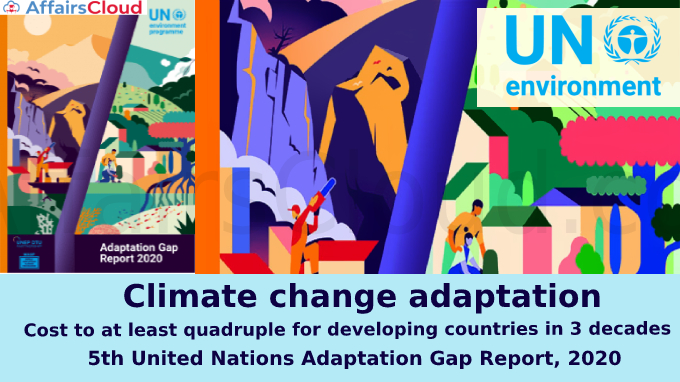 On January 14, 2021, the 5th edition of United Nations Environment Programme’s (UNEP) Adaptation Gap Report 2020 was launched during a high-level online press event. The report was produced by UNEP in collaboration with UNEP DTU Partnership (UDP) and the World Adaptation Science Programme (WASP).
On January 14, 2021, the 5th edition of United Nations Environment Programme’s (UNEP) Adaptation Gap Report 2020 was launched during a high-level online press event. The report was produced by UNEP in collaboration with UNEP DTU Partnership (UDP) and the World Adaptation Science Programme (WASP).
- In accordance with the report the actions required by the Paris Agreement are lagging behind. Though nations have successes in planning and implementation, there is a huge gap faced by developing countries, especially in Africa and Asia, in financing these planning.
- Notably, the annual cost of adaptation to the effects of climate change for developing countries is estimated to at least quadruple by 2050.
Reminder: Paris Agreement requires all its signatories to plan and implement adaptation measures through national adaptation plans, studies, monitoring of climate change effects and investment for sustainable climate.
Key Points:
–The current cost for developing countries is in the range of $70 billion (Rs 5.1 lakh crore) and may rise to $140-300 billion in 2030 and $280-500 billion in 2050
–Adaptation cost includes costs of planning, preparing for, facilitating and implementing adaptation measures.
–The world is heading for at least a 3°C temperature rise this century.
–COVID-19 pandemic has impacted adaptation efforts.
–On a positive front, three-quarters of all the countries have adopted at least one climate change adaptation planning instrument and most developing countries are working on national adaptation plans.
Recent Related News:
i.The Union Cabinet Minister Prakash Keshav Javadekar announced that the 13th Conference of Parties (COP) of the Convention on the Conservation of Migratory Species (CMS) of Wild Animals, an Environment Treaty Supported by United Nations Environment Programme (UNEP) is going to hosted by India at Gandhinagar in Gujarat, from 17th–22nd February 2020.
ii.According to the 2020 Global Status Report for Buildings and Construction released by Global Alliance for Buildings and Construction (GlobalABC), the Building & Construction sector accounted for 38% of CO2 emissions, and the CO2 emission increased to 9.95 GtCO2 (gigatonnes of carbon dioxide) in 2019.
About United Nations Environment Programme (UNEP):
Executive Director of UNEP – Inger Andersen
Headquarters– Nairobi, Kenya




